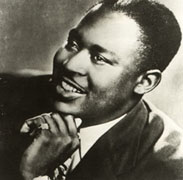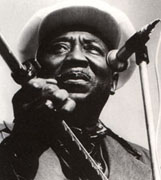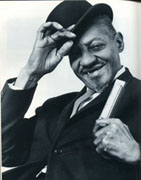Big Bill Broonzy
Buddy Guy
Elmore James


| What
is now referred to as the "classic Chicago style" was developed in the
late 1940s and early 1950s, taking Delta blues, amplifying it and putting
it into a small-band context. Adding drums, bass, and piano (sometimes
saxophones) to the basic string band and harmonica aggregation, the genre
created the now standard blues band lineup. The form was (and is) flexible
to accommodate singers, guitarists, pianists and harmonica players as the
featured performer in front of the standard instrumentation. Later permutations
of the style took place in the late 1950s and early 60s with new blood
taking their cue from the lead guitar work of B.B.King and T-Bone Walker,
creating the popular West Side sub genre which usually featured a horn
section appended to the basic rhythm section. Although the form embraced
rock beats and modern funk rhythms in the '80s and '90s, it has since generally
stayed within the guidelines developed in the 1950s and early 60s.
Quote
from Cub Koda at All-Media
Guide.
|
|
Big Bill Broonzy |
Buddy Guy |
Elmore James |
| When large groups
of blacks migrated north from the Mississippi and Louisiana Delta region,
many went to Chicago and brought with them their music, called the Delta
Blues. Like everything else, their music changed after being in the big
city and it emerged as the Chicago Blues. By the 1930s, Chicago Blues were
very popular and this popularity grew in the '40s and '50s.
Chicago Blues is high-spirited music that adds harmonica to guitar and keyboard, drumbeat, and later electric guitar and bass for a more powerful and sophisticated sound than its more low-key Delta cousin. Chicago Blues are hard-edged and loud because Chicago is a hard-edged, tough industrial city in which you have to be more powerful and louder in order to be heard. Some well-known musicians who play or have played the Chicago Blues are B.B. King, Junior Wells, Howlin' Wolf, and Muddy Waters. Quote
from Knowledge
Adventure.
|
|
Hawlin' Wolf |

Memphis Slim |

Muddy Waters |
| CHICAGO is the blues
capitol of the world — a musical metropolis filled with the electrified
sounds of snarling guitars, howlin' vocals, and big city rhythms. Striking
a chord with Chicago audiences in the 1930's, the Chicago blues sound has
continued to hold listeners firmly by the ears to this very day.
Quote
from A Chicago Blues Tour
at Big Chicago Record.
|
|
Robert Nighthawk |

Sunny Boy Williamson II |
Tempa Red |
| The
tour of Chicago electric Blues at the
Blues Tour in Geocities.
Site with helpful links concerning Chicago Blues at Angelfire Communicatons. |
 |
|
 |